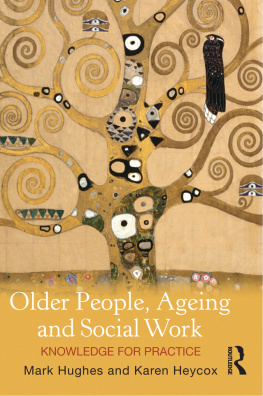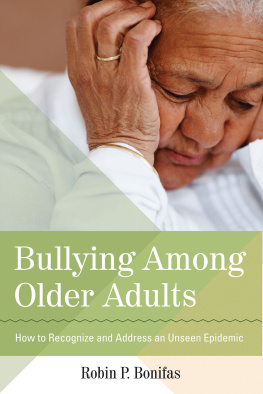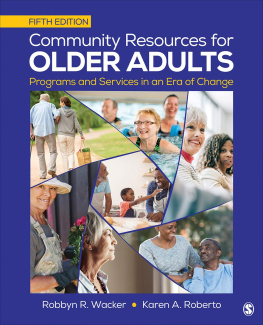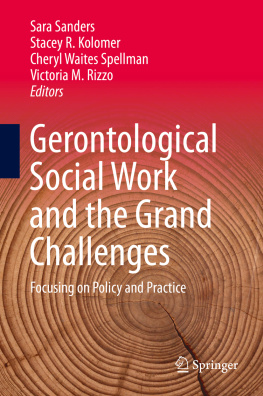Gerontological Social Work and COVID-19
The novel coronavirus and the resultant COVID-19 pandemic have disproportionately affected older adults in terms of the number of lives lost, concerns about the safety of institutional and home and community-based care, the impact of isolation and seclusion, and the ability to participate and engage in meaningful and contributory activities. The pandemic has uncovered layers of ageism that are embedded in societies globally and challenges us all to address the pervasive individual, institutional, and structural biases that permit age-based discrimination. Within the interdisciplinary field of gerontology, social workers lead organizations, provide direct services and supports, facilitate community engagement and participation, and deliver therapeutic interventions among other roles and activities that facilitate positive outcomes for older adults and their families.
In Gerontological Social Work and COVID-19: Calls for Change in Education, Practice, and Policy from International Voices, scholars, practice professionals, and other stakeholders reflect on the initial months of the pandemic. They articulate immediate needs the pandemic has created and uncovered, and further identify directions the field must go in to meet the moment and prepare for the future ahead.
This book was originally published as a special issue of the Journal of Gerontological Social Work.
Michelle Putnam, PhD, is Professor and Director of the PhD Program at the School of Social Work, College of Social Sciences, Policy, and Practice, Simmons University in Boston, USA. She is the Editor-in-Chief of the Journal of Gerontological Social Work.
Huei-Wern Shen, PhD, is Associate Professor in the Department of Social Work, College of Health and Public Service, University of North Texas in Denton, USA. She is the Managing Editor of the Journal of Gerontological Social Work.
First published 2022
by Routledge
2 Park Square, Milton Park, Abingdon, Oxon, OX14 4RN
and by Routledge
605 Third Avenue, New York, NY 10158
Routledge is an imprint of the Taylor & Francis Group, an informa business
2022 Taylor & Francis
All rights reserved. No part of this book may be reprinted or reproduced or utilised in any form or by any electronic, mechanical, or other means, now known or hereafter invented, including photocopying and recording, or in any information storage or retrieval system, without permission in writing from the publishers.
Trademark notice: Product or corporate names may be trademarks or registered trademarks, and are used only for identification and explanation without intent to infringe.
British Library Cataloguing-in-Publication Data
A catalogue record for this book is available from the British Library
ISBN13: 978-0-367-68610-9 (hbk)
ISBN13: 978-0-367-68613-0 (pbk)
ISBN13: 978-1-003-13828-0 (ebk)
DOI: 10.4324/9781003138280
Typeset in Minion Pro
by codeMantra
Publishers Note
The publisher accepts responsibility for any inconsistencies that may have arisen during the conversion of this book from journal articles to book chapters, namely the inclusion of journal terminology.
Disclaimer
Every effort has been made to contact copyright holders for their permission to reprint material in this book. The publishers would be grateful to hear from any copyright holder who is not here acknowledged and will undertake to rectify any errors or omissions in future editions of this book.
In December 2019 the novel coronavirus appeared in Wuhan, China and COVID-19 became the named disease associated with this virus in January 2020. The rapid spread of the novel coronavirus (SARS-CoV-2) has resulted in the global pandemic of COVID-19 with more than 34 million cases worldwide and over 1,009,000 deaths from the disease (Johns Hopkins University, 2020) at the time of this writing. Infection and mortality rates differ across nations. Data on the virus spread, as well as death attribution, is believed to be significantly under counted and reported (WHO, 2020a), by perhaps a factor of ten in the United States (Havers et al., 2020), one of the nations with the worst viral outbreak.
Sudharsanan et al. (2020) conducted a multi-national analysis of age-adjusted case fatality across 95 nations that considered their varying age-specific population distributions. They found that population age distribution accounts for 66% of the variance in national case fatality rates with nations with a greater proportion of older adults having higher fatality rates. Although they and others (Angelopoulos et al., 2020) caution that testing bias toward older adults and persons with more severe symptoms exits in many nations (and individuals with mild or moderate symptoms go untested) and may inflate the proportion of different age groups who are counted as COVID-19 positive -thus influencing incidence and mortality rates. That said, there remains clear evidence that older adults who contract COVID-19 are much more likely to die from the disease than middle-aged, younger adults or children (CDC, 2020; Klug, 2020a). Older adults remain statistically more likely to develop severe COVID-19 symptoms and to be hospitalized at disproportionate rates compared to other age groups (Shahid et al., 2020). About 75% of COVID-19 fatalities in the United States are adults age 65 and older (Wortham et al., 2020) and this pattern exists worldwide with estimates as high as 90% of all COVID-19 deaths occurring within the older adult population (Klug, 2020a). Additionally, global evidence is building that health disparities and structural inequalities resulting from racism and prejudice have contributed to worse outcomes among non-majority populations and/or populations sub-groups in the United States and United Kingdom (Bhala et al., 2020), Brazil (Baqui et al., 2020) and other nations (Lloyd-Sherlock et al., 2020). This includes worse outcomes among older adults in sub-groups who have experience life-long inequalities and marginalization and also experience ageism.
Ageism existed prior to emergence of SARS-CoV-2 but has been more widely exposed during this pandemic. This is perhaps seen most blatantly in guidelines that suggest rationing or limiting care for older adults and persons with disabilities, such as those initially forwarded in Italy at the beginning of their viral outbreak (Cesari & Proietti, 2020). But also evident in the wildfire-like spread of COVID-19 in nursing homes and older adult care homes worldwide which has brought a stronger spotlight to long-standing concerns about self-determination, choice of care location, availability and affordability of care services, and quality of care for older adults with functional limitations and social care needs (Klug, 2020b). In the ongoing analysis of the impact of the COVID-19 pandemic, the intersections of ageism, health disparities and structural inequalities should and will be investigated and considered. However, the roots of each of these phenomena run deep and what will be focused on in a sustained way during the current phase of the pandemic and post-pandemic remains to be seen.
The Journal of Gerontological Social Work (JGSW) put out a call for letters to the editor and commentaries in the beginning of the pandemic with the aim of providing a venue for scholars, particularly social work scholars, to highlight issues and concerns related to social work practice with older adults, the care and treatment of older adults, and social, economic and environmental factors affecting older adults as they experience this early era of the novel coronavirus and COVID-19. We received submissions from around the world and have pulled them together into this special collection. We recognize that not all issues, concerns or voices are represented here. The incredible disruption COVD-19 has created in individual lives and in communities has not spared scholars, researchers, or educators. In particular we acknowledge that individuals with fewer health, social and economic resources; individuals who are members of marginalized population groups or those experiencing discrimination; individuals with work, family, professional, and community responsibilities that require attention and care; and individuals with other obligations and needs may have desired to, but not have been able to, contribute to these calls. We remain open to hearing their voices and always encourage the submission of thoughtful manuscripts related to the pandemic including commentaries, research articles, policy analyses, media reviews, and other types of work to






